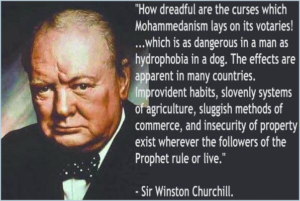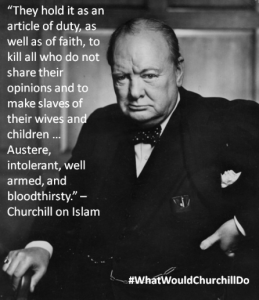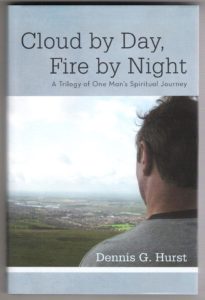Tags
Christ, Christianity, Conservatism, Donald Trump, Everlasting, Experience, Family, Freedom, Genealogy, God, Jesus Christ, Liberty, Life, Posterity, Self-Preservation, Sir Winston Churchill, Teaching, The Federalist, United States, Wisdom, WWII
Share it
And the Lord shall guide thee continually, and satisfy thy soul in drought, and make fat thy bones: and thou shalt be like a watered garden, and like a spring of water, whose waters fail not. ~ Isaiah 58:11
Sir Winston Churchill, my boyhood hero (and not only to me, but millions more born during WWII) was truly the great man and statesman of his generation. He wasn’t superhuman, as some would like to describe him, and neither did he want to be. He was a God-loving man, a man who never forgot his moral responsibilities. Unfortunately, like diamonds amongst gems, the Churchill-like personalities are rare.
Like all flawed human beings however, Winston Churchill had many faults – big fat cigars and hard liquor being but two of them. Yet the fact remains that if not for him the world today would likely have morphed into a frightening and demonic Nazi Empire far more atrocious than any other civilization that has come and gone before. When he was needed, he arose when called, and helped save Western civilization for future generations.
In January of 1861 when Jefferson Davis arrived in Montgomery, Alabama, to take on the presidency of the Confederate States of America, politician and journalist William Lowndes Yancey proclaimed “The man and the hour have met.” It turned out not to be so in that case; but it certainly did for Winston Churchill when he became Prime Minister on May 10, 1940.
As Jonathan Ehret expresses it in his review of ‘Darkest Hour’ in The Federalist:

With the release of “Darkest Hour” in theaters today, the larger-than-life personality and historical presence of Winston Churchill comes back to the forefront of the public’s imagination. The film perhaps introduces one of the most consequential figures of the twentieth century to a younger generation for the first time.
The film centers around arguably the most dramatic and perilous period in a lifetime of drama and danger: when Great Britain stood alone against the seemingly unstoppable onslaught of Nazi Germany. France had surrendered, the Low Countries had fallen, Scandinavia was occupied or cowed in fear, and Eastern Europe lay pinned under Nazi and Soviet jackboots. To a contemporary observer, resistance to the Nazis seemed hopeless.
More than a few neutrals threw in their lot with the Nazis in hopes of sharing the spoils of conquest, while others, including many in the United Kingdom, believed the only recourse was suing for peace on Adolph Hitler’s terms and praying a few precious scraps of freedom would remain to them. Churchill, almost alone, disagreed.

An anachronism even in his own day, Churchill clung to romantic notions of honor and imperial glory, which caused more than some of his peers embarrassment and would be mocked by many today. Although history now views him favorably for his foresight in predicting the Nazi threat, he was often on the wrong side of history, reluctant to embrace changes his countrymen viewed as inevitable.
Churchill was steadfastly against India’s independence, or of any diminishment of the British Empire. He long clung to the dream of his country maintaining its mantle as the world’s sole superpower and sole arbiter of peace. He was wrong, and history moved on with or without him. But whereas most of the rest of the free world believed the scourge of war had ended forever in 1919, Churchill knew there would always be new dragons to face.
To read Jonathan Ehret to completion click here…
*********************

Sir Winston Churchill on Islam…
By 1944 there was only one way the war was going to end, and that was with Germany utterly crushed. There were elements within the Roosevelt administration that wanted to reduce Germany to an agricultural client state to make sure that they never troubled other nations again. FDR wasn’t in favor of it (and later on, neither was Truman), but at the time there was a lot of belief that there was something wrong with Germany and the only way to keep them from starting another war was to put a boot on their neck forever.
Of course Britain did not stand entirely alone. Canada, Australia, New Zealand, South Africa, as free countries under the British Crown, stood with it as did populous colonies such as India, all of whom contributed many young men of many races to the struggle.
Before World War II, it was said that “the sun never sets on the British Empire.” While that sounds like nationalistic chest-beating to modern ears, it also happened to be true. The United Kingdom’s colonies straddled the globe, from Africa to Polynesia, India, and on into present-day Malaysia, Singapore, Hong Kong, the Falkland Islands, even Bermuda and the Bahamas off our East Coast. Had the UK either fallen or become a Vichy-like puppet to National Socialist Germany, all of these places would have been promptly infiltrated by many more Nazi agents than Berlin already had stationed in them.
It took every ounce of national will the Allies could muster to contain and defeat Hitlerism as it was. Opening the colonies to even more Nazi depravity might well have shifted the decisive advantage to Germany during the great war.
Sir Winston was right: England’s brave stand in 1940 really was her finest hour, even though she ultimately lost the Empire as a result.
Churchill was a great man who was in the right place at the right time … Yet if only they had listened to him sooner.
And they that shall be of thee shall build the old waste places: thou shalt raise up the foundations of many generations; and thou shalt be called, The repairer of the breach, The restorer of paths to dwell in. ~ Isaiah 58:12
********************

Soli Deo Gloria!


 Link To DennisGHurst.com
Link To DennisGHurst.com


